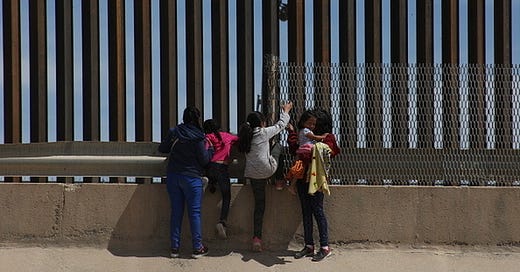Democrat Border Games
"Are you gonna believe us or your lying eyes," asks Jerry Nadler. "Would we lie to you?"
Yesterday, the House Judiciary Committee began with Jerry “The Zipper” Nadler calling anyone who supports controlling our border as a racist and putting forth witnesses who agreed with the fiction that there is no issue with illegal immigration.
All of which goes against the government’s own numbers.
A Democrat Judge from El Paso County essentially said, “What illegal immigration? It’s not happening in my county.”
Never mind that El Paso County posted record illegal border crossings in the past two months. This is from a Yahoo News article:
“El Paso saw its highest-ever level of migrant encounters in the first three months of fiscal 2023 since the U.S. government erected a border fence, according to U.S. Border Patrol.”
The Border Patrol's El Paso Sector — which includes part of West Texas and all of New Mexico — reported 162,603 encounters with migrants from October through December. The agency apprehended or received more than 50,000 migrants each of those three months, a nearly 40-year record, according to the agency.
The quarterly total was more than three times higher than the same period a year ago, when the Border Patrol reported 49,000 encounters total in the first quarter of fiscal 2022.
Yep. Nothing to see in El Paso. Move along.
Back in 2017, the left held a #ADayWithoutImmigrants – which was really just an excuse to try to celebrate illegal immigration by commingling it with legal immigration and claiming that conservatives are against legal immigration.
I am a proponent of strong borders. I was asked why I think borders are important and it seems to be rooted in that not having national borders raises conflicting issues and the only way I can reconcile them is to have a border and when it is established, control it.
In my mind, there are three questions to consider:
What is worth protecting?
What makes that thing worth protecting?
How can that thing best be protected?
To understand what is worth protecting, one must ask for what it is that people coming here illegally would risk death, injury, imprisonment, and deportation - because whatever that is, what they see is something of significant value. Many say that people come here illegally due to the economic opportunity. Some say it is to escape persecution, that they come to experience the safety and liberty America represents.
If is true, then one must ask what makes the conditions of economic opportunity and liberty possible.
It can be successfully argued that the one thing that supports all the things of value is a stable and predictable legal system based on a set of principles that put individual economic freedom and individual liberty first. America does that with the Constitution of the United States, the basis for the rights of every citizen.
Now it must be asked how the Constitution is to be administered – that is to ask, how, where and to whom do Constitutional protections extend?
Administering the mechanism by which the conditions that attract people to America must have limits. A person can’t travel to another region of the world and expect to operate under the same conditions as exist in America, so the limit is a political border, an imaginary line, when crossed American rules either do or do not apply. We don’t allow Canadian or Mexican laws to apply here because they are not consistent with American law. It is also not possible to have people come to America and commit acts that are not allowed under our legal system and then claim that those laws do not apply to them because they are non-citizens.
To allow other laws to apply in America would destroy the very value America represents.
This is where the issue of a definitive, defended border comes into play.
The idea that a nation-state has the right to establish borders is an idea based on the concept of sovereignty. From the dawn of time, as men sought to organize into groups and then into governing structures, a basic aspect of any communal or governmental aggregation of people has been accorded the right to create and maintain a state of sovereignty – or as defined philosophically: having supreme authority within a territory.
Within a sovereign area, there are two types of sovereignty, “de jure”, or legal, sovereignty concerns the expressed and institutionally recognized right to exercise control over a territory. This can be defined as the laws, regulations and rights accorded the citizens by the controlling legal authority – this is the framework.
Then there is “de facto” sovereignty. De facto, or sovereignty in fact, is in distinctly different from de jure sovereignty. This concept is concerned with whether control in fact exists. There are many corresponding pieces to “de facto” sovereignty – cooperation and respect of the populace; control of resources in, or moved into, an area; means of enforcement and security; and ability to carry out various functions of state all represent measures of de facto sovereignty.
It has been said that one can have open borders or a welfare state, one cannot have both – but in my mind, America cannot have open borders and keep its Constitution…and if the Constitution cannot be kept then neither can the conditions that make America valuable to its citizens.





Borders, Culture, Language!